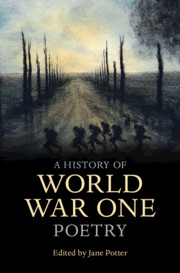Book contents
- A History of World War One Poetry
- A History of World War One Poetry
- Copyright page
- Dedication
- Contents
- Illustrations
- Contributors
- Acknowledgements
- Introduction
- Part I Literary Contexts
- Part II Nations and Voices
- Part III Poets
- Chapter 20 Non-Combatants
- Chapter 21 Edward Thomas (1878–1917)
- Chapter 22 Guillaume Apollinaire (1880–1918)
- Chapter 23 Siegfried Sassoon (1886–1967) and Edmund Blunden (1896–1974)
- Chapter 24 Anna Akhmatova (1889–1966)
- Chapter 25 Mary Borden (1886–1968)
- Chapter 26 Georg Trakl (1887–1914)
- Chapter 27 Isaac Rosenberg (1890–1918)
- Chapter 28 Ivor Gurney (1890–1937)
- Chapter 29 Wilfred Owen (1893–1918)
- Chapter 30 David Jones (1895–1974)
- Part IV
- Bibliography
- Index
Chapter 21 - Edward Thomas (1878–1917)
from Part III - Poets
Published online by Cambridge University Press: 18 January 2023
- A History of World War One Poetry
- A History of World War One Poetry
- Copyright page
- Dedication
- Contents
- Illustrations
- Contributors
- Acknowledgements
- Introduction
- Part I Literary Contexts
- Part II Nations and Voices
- Part III Poets
- Chapter 20 Non-Combatants
- Chapter 21 Edward Thomas (1878–1917)
- Chapter 22 Guillaume Apollinaire (1880–1918)
- Chapter 23 Siegfried Sassoon (1886–1967) and Edmund Blunden (1896–1974)
- Chapter 24 Anna Akhmatova (1889–1966)
- Chapter 25 Mary Borden (1886–1968)
- Chapter 26 Georg Trakl (1887–1914)
- Chapter 27 Isaac Rosenberg (1890–1918)
- Chapter 28 Ivor Gurney (1890–1937)
- Chapter 29 Wilfred Owen (1893–1918)
- Chapter 30 David Jones (1895–1974)
- Part IV
- Bibliography
- Index
Summary
The poetry of Edward Thomas (1878–1917) was all written during the First World War, but that war is frequently absent.He is an unusual war poet: an ‘Arts and Crafts’ war poet; a war poet who is focused on home but nonetheless committed to action and engagement with the world; a modern poet at home in the old wars and with the old tunes; a war poet of peacefulness.Thomas’s poetry addresses the war in its own way, directly and indirectly, with its own inclusive, hesitant, honest voice.We can see the uniqueness of his approach by looking at poems like ‘Adlestrop’, ‘The Manor Farm’, ‘The Combe’, ‘As the Team’s Head-Brass’, ‘The Owl’, ‘A Private’, ‘Digging’ and ‘Tears’.Thomas said of war poetry that ‘No other class of poetry vanishes so rapidly, has so little chosen from it for posterity’, but his own survived, and not simply because it contained very little of the war.
- Type
- Chapter
- Information
- A History of World War One Poetry , pp. 350 - 364Publisher: Cambridge University PressPrint publication year: 2023

